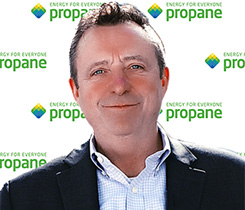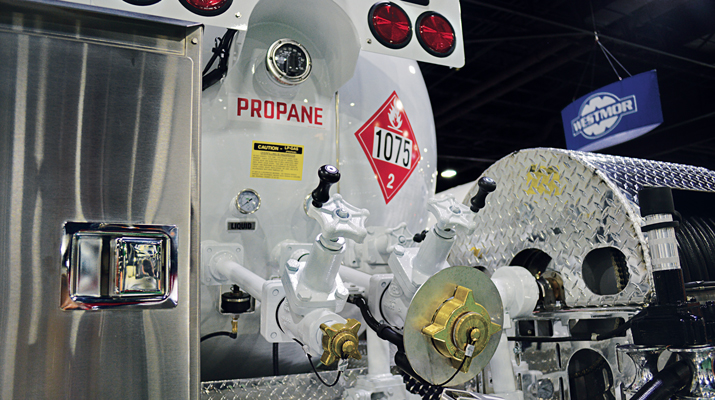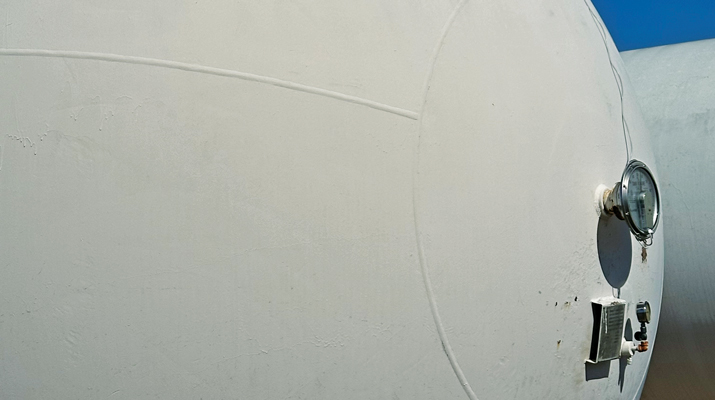Organic fertilizer manufacturer relies on propane
A growing organic fertilizer manufacturer in Florida is reaping the benefits of propane and the fruitful working relationship he’s developed with his retailer.
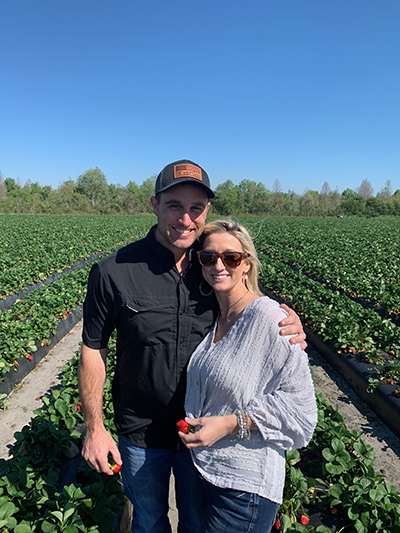
Andrew and Joanna Bass of Organic Growing Solutions. Photo courtesy of Andrew Bass
When Andrew Bass, owner and CEO of Organic Growing Solutions, bought his 27-acre property in Live Oak, Florida, he considered hooking up to the existing natural gas line to help meet the heating needs of his unique product. The company received an unfavorable monthly quote that didn’t include the cost of gas, on top of having to lock in the rate for 20 years.
“I didn’t like the idea of being committed to somebody for 20 years,” Bass says. “I haven’t even been married for 20 years.”
Fortunately for Bass, he was already familiar with propane. Prior to opening his current facility last year, he operated a small pilot facility with several 1,000-gallon propane tanks that required constant bobtail fills. Increasing customer demand forced the company to leave the rented space and build a bigger and better facility. That plan came to fruition in March 2019 when Organic Growing Solutions opened a 33,000-sq.-ft. building.
“We’ve been servicing [Organic Growing Solutions] going on six years,” says Brandon Hewett, president of J&J Gas Service in neighboring Mayo, Florida. “When [Andrew] started out, it was experimental, and he was leasing a facility. He had everything on a minimal scale. We had thousand-gallon tanks sitting there temporarily. Then he bought a piece of property and relocated, and he built his own facility to handle his supply and demand.”
J&J Gas Service assisted as Organic Growing Solutions launched its trial runs, and Hewett served as a resource as Bass brainstormed ideas for the new facility. Bass ultimately chose two 18,000-gallon tanks instead of a single 30,000-gallon tank for his propane supply. The extra 6,000 gallons of wet surface area on the two 18s provided more vapor pressure needed for the application than a single 30, Hewett points out.
“Natural gas is not always the answer,” says Boyd Kneen of Utility Energy Systems. “Propane can compete.”
Minnesota-based Utility Energy Systems is a nationwide solution provider for propane system needs, with many of its projects taking place in the Upper Midwest, according to the company. It targets the equipment needs of the agricultural sector, helping farmers reduce their costs of grain drying through transport-quantity propane buying. In this case, the company secured the propane tanks and installed the underground lines for Organic Growing Solutions.
“The cost compared to bringing natural gas in versus going with a propane system, hands down, propane was the best economic value for him and it was going to be reliable,” Kneen says of Bass.
From manure to fertilizer
Having a reliable propane supply is crucial for Bass’ needs because the product he’s making for growers is dependent on heat.
To make the organic fertilizer, Organic Growing Solutions uses chicken manure, which Bass obtains from suppliers, as the key feedstock. The manure arrives wet, at around 40 to 50 percent, and the company’s process drops that moisture level to less than 12 percent, Bass explains. The manure is granularized before it’s moved into an 80-ft. rotary drum dryer and met with propane-produced, 2,000-degree heat from a 5-million-Btu burner.
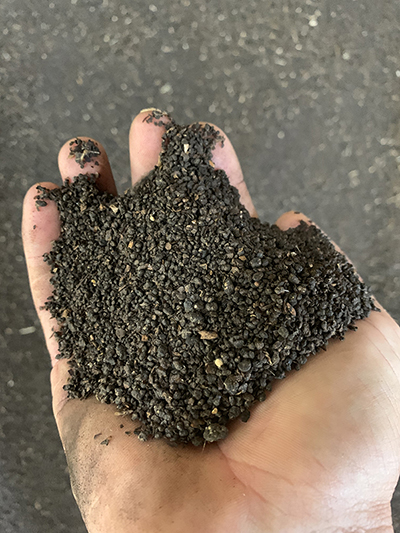
Organic Growing Solutions uses LPG to heat and dehydrate its chicken manure fertilizer. Photo by Andrew Bass
“We like to hit it with a lot of heat on the front end,” says Bass. “It takes a lot of heat to get the moisture out. That’s what people are paying for – that heating process. We can granularize it and make it a pretty ball, but if it’s still wet, we couldn’t sell it for anything.”
The heat kills pathogens and anything else that could create a negative environment for plants or people; it makes the nutrients more available and the finished product easier to spread, Bass says. The end result is a fertilizer that Organic Growing Solutions calls Everlizer, which it says contains all of the necessary nutrients needed to grow a healthy plant.
“We’re almost going back to the basics,” Bass says. “Chicken manure was kind of like the first fertilizer, what people always used. It’s tried and true.”
But it takes nine months to a year to naturally compost raw manure and allow adequate breakdown of the nutrients so it will be absorbed with no harm by the plants, says John Nuckols, energy consultant at Utility Energy Systems.
“He upped the game by saying let’s a create a product that’s been cleaned up and prepared that can be distributed and spread in a more efficient and consistent manner for the market,” Kneen adds.
Organic Growing Solutions, with four employees, sells the fertilizer to organic growers and larger conventional growers across the Southeast, even extending to New York and Connecticut.
Many of Bass’ customers grow higher-end produce, he says, including blueberries, strawberries, tomatoes, bell peppers, squash and carrots. The spring and fall are typically the company’s busier times, but it will pick up seasonal work. It even supplies key ingredients for Scotts products that can be found in Lowe’s and Home Depot.
Bass says his new facility is producing about 12,000 tons of fertilizer per year, with the capability to reach 50,000 tons.
“Our old plant could only do so much in a year,” he says. “We didn’t seek a lot of new customers; now we’re starting to try to get new customers.”
Possible with propane
With customer growth comes the need for more propane, a task being met by J&J Gas Service transports.
Hewett says the retailer supplied 127,000 gallons of propane for Bass’ operation last year and, as of mid-June, had sold about 45,000 gallons in 2020.
“It could be a load once a week and then we may not send him another transport for three or four weeks,” Hewett adds.
In addition to meeting the needs of his fertilizer-manufacturing process, Bass is finding another benefit to using propane – it can also fuel the company’s two forklifts from a 500-gallon tank on-site. While Organic Growing Solutions sells most of its product in bulk, it does package the fertilizer for Scotts in 2,000-pound sacks. It will burn through two forklift cylinders a day while loading the product, Bass says.
It’s all part of a positive propane experience for him and his company.
“It’s clean,” Bass says when asked about using propane for his operation. “I’ve been happy. I don’t even know what else we would do. Even if I had natural gas, I would have propane as a backup. For me, it’s too easy, too convenient.”
Featured photo by Andrew Bass








